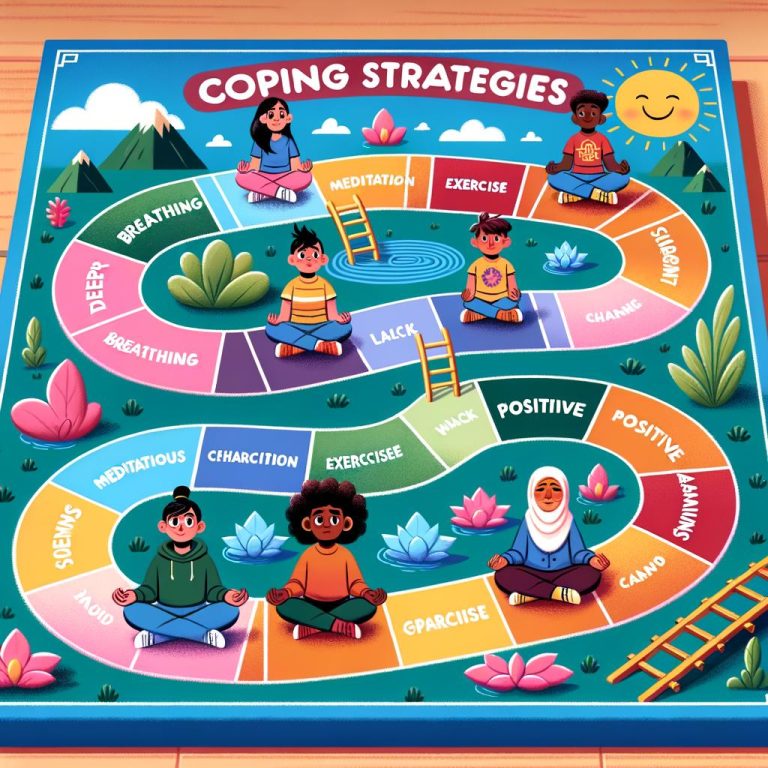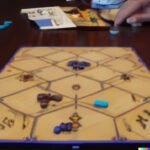Coping strategies are essential tools for managing stress, anxiety, and other mental health challenges. One innovative approach to developing these strategies is through the use of a coping strategies board game. These games offer a fun and interactive way to practice self-care techniques, improve emotional regulation, and enhance overall well-being.
Board games have long been recognized for their ability to bring people together, promote social interaction, and provide entertainment. However, they also have significant benefits when it comes to mental health. By incorporating coping strategies into gameplay, individuals can learn valuable skills in a relaxed and enjoyable setting.
In this article, we will explore the concept of coping strategies and delve into how they can positively impact mental health. We will also discuss the advantages of utilizing board games as a tool for coping and stress relief, highlighting some of the most recommended coping strategies board games currently available.
Additionally, we will provide tips on selecting the right game based on individual needs, instructions on how to play effectively, real-life success stories, DIY ideas for creating personalized games, expert advice, and resources for further information. Join us on this journey to discover the transformative power of coping strategies board games in improving mental well-being.
The Benefits of Using Board Games for Coping Strategies
Coping strategies board games offer a unique and interactive approach to managing stress, anxiety, and other mental health challenges. These board games provide individuals with a fun and engaging way to learn and practice coping skills in a safe environment. By incorporating elements of play, competition, and strategy, coping strategies board games can help individuals develop new coping mechanisms, improve problem-solving abilities, enhance emotional regulation, and build resilience.
Enhances Social Support and Connection
One of the key benefits of using board games for coping strategies is the opportunity they provide for social support and connection. Playing these games with friends, family members, or support groups can create a sense of community and belonging.
In addition to providing a distraction from negative thoughts or emotions, engaging in gameplay with others can foster communication, collaboration, and teamwork skills. This social interaction can help reduce feelings of isolation and loneliness while promoting positive relationships and emotional well-being.
Promotes Relaxation and Stress Relief
Board games are known for their ability to promote relaxation and stress relief by offering a break from daily routines and responsibilities. Engaging in gameplay allows individuals to focus their attention on the game itself, shifting their thoughts away from stressors or worries temporarily.
The stimulating yet enjoyable nature of board games can also trigger the release of endorphins – the body’s natural feel-good chemicals – which can help improve mood and reduce tension. Additionally, the strategic thinking required in many board games can serve as a form of mindfulness practice, encouraging players to stay present in the moment and engage fully with the game experience.
Builds Cognitive Skills and Resilience
Using board games for coping strategies can help individuals build essential cognitive skills such as problem-solving, decision-making, critical thinking, memory recall, and adaptability. By navigating through different game scenarios, players are encouraged to think creatively, analyze situations objectively, explore multiple solutions, learn from mistakes, and practice effective decision-making under pressure.
These cognitive challenges not only enhance mental acuity but also cultivate resilience – the ability to bounce back from setbacks or difficulties stronger than before. Coping strategies board games offer a safe space for players to test out different coping techniques in various contexts while honing their problem-solving skills in a supportive setting.
Popular Coping Strategies Board Games
When it comes to managing stress and improving mental health, board games can be a fun and effective tool. There are several popular coping strategies board games that are specifically designed to help individuals cope with challenges and build resilience. One such game is “Mindful Me” which focuses on mindfulness exercises and relaxation techniques. This game encourages players to practice self-care activities and positive affirmations, promoting a sense of calmness and inner peace.
Another recommended coping strategies board game is “Emotions Charades,” which helps players identify, express, and manage their emotions effectively. By acting out different feelings in a safe and supportive environment, players can enhance their emotional intelligence and communication skills. This game promotes self-awareness and empathy, crucial elements in developing healthy coping mechanisms.
Furthermore, “Stressbusters” is a popular coping strategies board game that offers practical tips and strategies for reducing stress levels. From deep breathing exercises to problem-solving techniques, this game equips players with valuable coping skills that can be applied in real-life situations. By engaging in interactive gameplay, individuals can learn how to better cope with stressors and improve their overall well-being.
In addition to these examples, there are various other coping strategies board games available on the market that cater to different needs and preferences. Whether you’re looking to enhance your mindfulness practices or improve your emotional regulation skills, incorporating these games into your self-care routine can have a positive impact on your mental health. The key is to find a board game that resonates with you personally and aligns with your coping goals.
How to Choose the Right Coping Strategies Board Game
When choosing the right coping strategies board game, it is essential to consider individual needs and preferences to ensure that the game effectively aids in stress relief and mental health management. Here are some tips and guidelines to help you select the best board game for your coping strategies:
- Identify Your Personal Coping Style: Determine whether you prefer games that are more competitive, cooperative, or solo-play. Understanding your coping style will help you choose a board game that aligns with your preferences.
- Consider Your Interests and Hobbies: Select a coping strategies board game that resonates with your interests and hobbies. Whether you enjoy strategy-based games, storytelling, or puzzle-solving, choosing a game that matches your interests can make the experience more enjoyable and effective.
- Consult Reviews and Recommendations: Research different coping strategies board games online and read reviews from other users who have used the games for stress relief. Consider recommendations from mental health professionals or support groups to find a game that has been proven effective by others.
By taking these factors into account, you can choose a coping strategies board game that suits your individual needs and preferences, ultimately enhancing its effectiveness in promoting mental wellbeing. Remember that the goal is to find a game that not only helps you cope with stress but also brings enjoyment and relaxation during gameplay.
Remember, the key is to find a coping strategies board game that resonates with you personally and provides a sense of comfort or distraction when needed. Experiment with different games until you find the one that truly helps you manage stress effectively while having fun in the process.
How to Play Coping Strategies Board Game
Coping strategies board games are a great way to integrate fun and relaxation into mental health management. These games are specifically designed to help individuals develop healthy coping mechanisms, reduce stress, and improve overall well-being. Playing a coping strategies board game can provide an interactive and engaging way to practice important skills that promote resilience and emotional regulation.
To effectively play a coping strategies board game, follow these step-by-step instructions:
- Set the Scene: Choose a comfortable and quiet space to play the game where you can focus without distractions.
- Read the Instructions: Take some time to familiarize yourself with the rules of the game and understand how it works.
- Gather Supplies: Make sure you have all the necessary components of the game, such as dice, cards, or game pieces.
- Select Your Strategy: Depending on the game, decide on a coping strategy you want to focus on during gameplay, whether it be mindfulness, self-compassion, or relaxation techniques.
Playing a coping strategies board game can be a valuable tool for honing important skills while having fun. By actively engaging in these games, individuals can learn effective ways to manage stressors, regulate emotions, and build resilience. Incorporating coping strategies board games into your routine can be a beneficial addition to your mental health toolkit.
Remember that the ultimate goal of playing a coping strategies board game is not just winning but also learning new skills and tools for managing difficult situations. Take the time to reflect on your gameplay experience after each session and observe how different coping strategies work for you. With practice and dedication, playing coping strategies board games can become an enjoyable and effective part of your mental health routine.
Real-Life Success Stories
Board games have been a source of entertainment and social interaction for many people, but they can also serve as powerful tools for coping with stress and improving mental health. Individuals across the globe have discovered the benefits of using coping strategies board games to enhance their overall wellbeing. These games offer a structured and engaging way to practice coping skills, manage emotions, and build resilience in a supportive environment.
One inspiring success story involves Sarah, who struggled with anxiety and low self-esteem for years. Through the recommendation of a therapist, she began playing a coping strategies board game that focused on mindfulness and relaxation techniques. Sarah found that the repetitive gameplay helped her calm her racing thoughts and stay present in the moment.
Over time, she noticed a significant decrease in her anxiety levels and an increase in self-confidence. The coping strategies board game became an essential part of Sarah’s self-care routine, allowing her to better cope with life’s challenges.
Another remarkable story comes from Mark, a military veteran dealing with PTSD. Traditional therapy was helpful for him, but he was looking for additional tools to manage his symptoms on a daily basis. Mark discovered a coping strategies board game specifically designed for individuals with trauma-related issues.
This game encouraged players to identify triggers, practice grounding techniques, and develop healthy coping mechanisms. By regularly playing this board game, Mark saw a reduction in his PTSD symptoms, improved his relationships with loved ones, and regained a sense of control over his life.
| Success Story | Impact |
|---|---|
| Sarah | Decrease in anxiety levels and increase in self-confidence |
| Mark | Reduction in PTSD symptoms, improved relationships, sense of control |
DIY Coping Strategies Board Game
Creating your own personalized coping strategies board game can be a fun and creative way to tailor your mental health management techniques to your specific needs. By customizing the game, you can address your unique stressors and triggers, making the process of coping more effective and engaging. Whether you are struggling with anxiety, depression, or just looking for a way to manage everyday stress, a DIY coping strategies board game can be a valuable addition to your self-care routine.
One idea for creating your own coping strategies board game is to start by identifying different coping mechanisms that work best for you. These can include activities like mindfulness meditation, deep breathing exercises, journaling, physical exercise, or spending time in nature.
Once you have a list of coping strategies that resonate with you, think about how you can integrate them into a board game format. For example, each square on the board could represent a different coping strategy, and players must perform the associated activity when they land on that square.
To make your DIY coping strategies board game even more engaging, consider adding challenges or prompts that encourage players to practice their coping skills in various scenarios. For instance, create cards with different stressful situations or triggers written on them, and players must use their coping mechanisms to navigate through these challenges. This interactive approach not only makes the game more dynamic but also helps reinforce positive coping habits in real-life situations.
| Benefits of DIY Coping Strategies Board Game | Steps to Create a DIY Coping Strategies Board Game |
|---|---|
| Customized to individual needs | Identify preferred coping mechanisms |
| Promotes engagement in mental health management | Integrate coping strategies into gameplay |
| Encourages practice of coping skills in different scenarios | Add challenges or prompts for interactive play |
Expert Advice and Resources
In conclusion, incorporating coping strategies board games into one’s mental health management routine can offer a unique and engaging way to cultivate resilience, reduce stress, and enhance overall well-being. By utilizing these specially designed games, individuals can learn valuable skills such as problem-solving, emotional regulation, and effective communication in a fun and interactive manner. The benefits of using coping strategies board games extend beyond mere entertainment, providing a holistic approach to improving mental health.
Moreover, the availability of a wide range of coping strategies board games cater to various preferences and needs. From collaborative games that encourage teamwork to competitive ones that stimulate strategic thinking, there is a game suitable for every individual looking to enhance their coping skills. Whether played solo or with friends and family, these board games offer a versatile tool for developing healthy coping mechanisms in a supportive environment.
As individuals navigate the complexities of daily life and face different stressors, having access to expert tips and additional resources on coping strategies board games can be invaluable. By staying informed about the latest developments in the field of mental health management through reputable sources and seeking guidance from professionals when needed, individuals can maximize the benefits of incorporating these board games into their wellness routine.
Ultimately, by embracing the power of play and leveraging the therapeutic potential of coping strategies board games, individuals can take proactive steps towards achieving emotional resilience and mental well-being.
Frequently Asked Questions
What Is the Coping Strategy Board Game?
The Coping Strategy Board Game is a therapeutic tool designed to help individuals learn and practice healthy coping mechanisms for managing stress, anxiety, and other mental health challenges. Players navigate the game board while discussing various coping strategies to build resilience.
What Is the Coping Skills Match Game?
The Coping Skills Match Game is a interactive activity that helps individuals identify and match different coping skills with specific situations or emotions. By engaging in this game, players can improve their ability to recognize when to use certain coping techniques for optimal mental well-being.
What Is the Coping Strategies Wheel?
The Coping Strategies Wheel is a visual aid that displays an array of coping mechanisms in a circular format. This tool allows individuals to quickly reference and choose appropriate strategies based on their current emotional state or stressors. The wheel provides a dynamic and flexible approach to self-care practices.

I love playing all kinds of games – from classics like Monopoly to modern favourites like Ticket to Ride.
I created this blog as a way to share my love of board games with others, and provide information on the latest releases and news in the industry.





